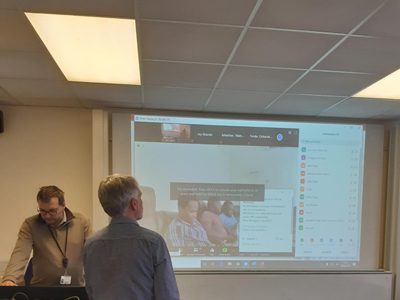The Coronavirus outbreak has changed everything and whilst we are rapidly rethinking our working arrangements and research approaches, the question arises: Can we move to online working for research, that is hold meetings, conduct research related activities and carry out training, and still be effective? The GCRF BRECcIA project’s answer to that question is a resounding ‘yes’!
Having run a 2-week virtual workshop instead of the residential one we had planned, we would say that, although digital delivery is in many ways very different (see our PDF on key lessons learned) and notably the pace is much slower, you can still achieve excellent outcomes – as good as those you would realise with a face-to-face workshop. But a virtual workshop requires you to think very carefully about your objectives and to plan in detail, as well as the creative and imaginative use of digital media. Although it is fair to say we stumbled into the latter, as we all (facilitators and researchers) grew in our digital confidence as the workshop progressed.
~~~
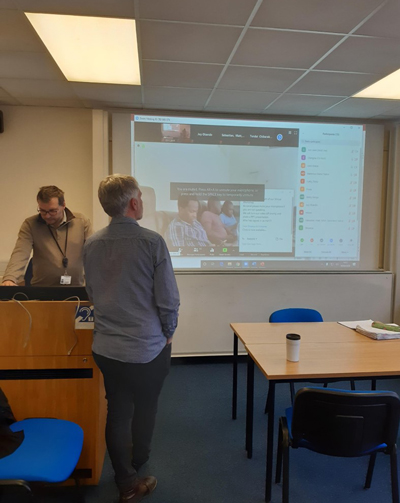
Monitoring the spread of the coronavirus in Europe, we took the decision on the 5th March 2020 to cancel travel to the UK for our Spring workshop in Southampton, which was due to run from 9th to 20th March. At the time, this was a difficult decision as we were among the first to cancel/postpone events in the UK. But with participants expected to begin their journeys from several African countries on the 7th, we all agreed (including participants) that given the level of uncertainty of the situation, cancelling travel seemed the most sensible thing to do. There was much concern that participants might be stranded in the UK by the end of the workshop and unable to return home – with hindsight, of course, this proved the correct course of action.
The workshop was, however, a vital one and postponing it to a later date was not a viable option as the research and associated training was at a critical point and required reviewing and pulling together. So, we decided to proceed with a workshop as the time was already protected in everyone’s diaries – and the obvious solution was to hold it in a virtual format.
To be honest, whilst we have been successfully running monthly webinars in BRECcIA for some time, none of us had much experience of online delivery over several days let alone a couple of weeks. Whilst some had delivered teaching online, training is slightly different and at its best when it is experiential and interactive – all of which appeared to present an especial challenge. We had no idea if this would be achievable online and undoubtedly, a two-week virtual workshop is on another scale entirely compared with face-to-face delivery.
Yet, we went from the slightly hesitant question of ‘how do you share the screen?’ (which was uttered not long after the photo in Figure 1 was taken), to the confident and spontaneous suggestion of ‘let’s have an online poll!’ during a session on policy, three days later. There was a palpable difference in confidence in working online between week 1 and week 2, and by the end of the workshop we seemed to have achieved the level of international interaction and collaborative working we have been trying to encourage for two years – and much to our surprise.
So, what did we do? We used the first Monday of the workshop to review the programme and to identify the key objectives. If we could only achieve one or two things, what would they be? This confirmed the priorities on the research side would be in assessing the stage of research in each of 26 small research projects (SRPs), identifying synergies and where they could be combined, and ensuring everyone had the research methods to the appropriate standard needed, to complete these SRPs. On the professional development side, BRECcIA is moving into the networking and policy influence phase of its programme, so those sessions remained as second order priorities. We were committed to a career development day with Vitae, but everything else in the programme was flexible – if we could include a writing retreat, training in digital media and interdisciplinarity, as originally planned, we would; but they would all be a bonus.
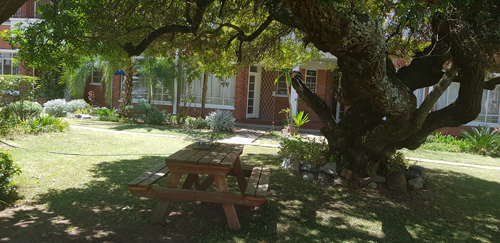
Time zones inevitably restricted the workshop hours to between 9am and 14.30 for UK & Ghana, which was 10:00 to 15.30 in Niger; 11:00 – 16:30 in Malawi, Zimbabwe, Botswana, and South Africa, and 12:00 -17:.30 Kenya time. Managing lunchtimes during the sessions proved tricky and we would plan those more carefully next time. Revisiting and agreeing the priorities within the context of the time available, determined our new plan for delivery.
We clustered researchers mostly by location, i.e. those based in Southampton, Malawi, Ghana and Nairobi into Offline Teams to help organize offline discussion, learning activities and homework, and established a Virtual team for the researchers who were more geographically dispersed. Indeed, sorting the researchers into teams in advance proved vital initially, although by week 2 the researchers were confidently realigning themselves into teams as they might in a traditional class. Senior researchers in the team volunteered to facilitate and support the teams as Offline Facilitators. The Offline Facilitators also proved invaluable by supporting each team with a mentor.
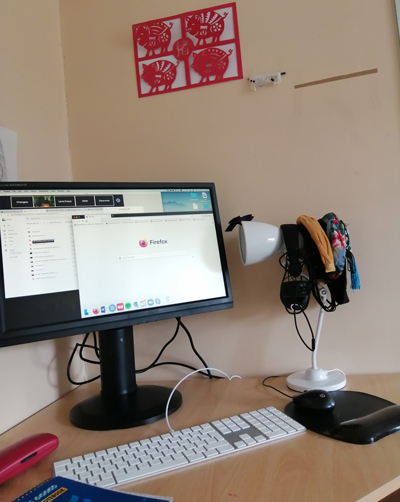
What was surprising is how rapidly we evolved our online practice. We agreed, by the end of Day 1, to have regular morning meetings online i.e. a Daily Update and end of day emailed debriefs, the Daily Debrief, to provide structure. The personal connection was critical as we were unable to renew relationships in person; so, each morning, from Day 2, we took it in turns to briefly turn webcams on to greet each other and for participants’ to share photos of their locations for a Daily Weather report. Sharing photos, no matter how trivial, was a nice way to connect with each other. During the writing retreat we shared pictures of our working spaces – as in Figures 2 & 3.
Online facilitation requires a good deal of concentration and effort and is more tiring than face-to-face formats. Sitting down for more than an hour is hard for participants too, so facilitators need to be sensitive to this fact. As a facilitator you need to pay continual attention to what is happening, so online sessions need to be shorter and the offline breaks or activity more regular. This means being very focused about what you can realistically achieve; for us it could be just two or three exercises a day! But don’t let the limitations put you off – you can achieve high quality outcomes – just fewer of them.
We still held the Poster session we had planned because it was essential for assessing the SRPs. We did this by splitting the presentations over the two weeks, rather than the single showcase session in the original schedule. Each poster was presented for 5 minutes and received verbal and written feedback from another group, with a schedule of which group was giving feedback on which poster developed in advance. Four or five poster presentations at a time was ideal.
We held a Writing retreat, where we discussed our writing practice, the structure of papers and disciplinary differences, and had an hour dedicated to individual writing goals (a ‘productive bubble’). We also wanted individuals to have time to consider their careers, so we continued with a career planning day which Vitae ran for us using the Researcher Development Framework, an attributes framework of knowledge, skills, behaviours and qualities relevant for researchers.
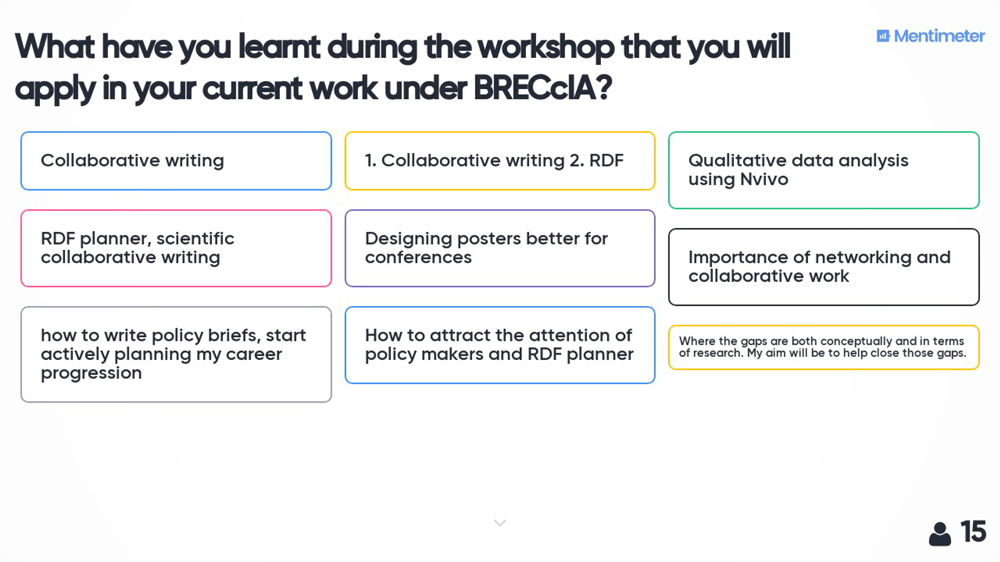
Reviewing the range of activity at the end of the two weeks, it seemed that we had deployed an impressive array of techniques.
In addition to the posters, career planning and writing retreat, we:
- Provided specific training in key research software and methods, including: Qualitative data analysis; hands-on with Nvivo; statistical computing using R; GIS for spatial data visualisation and analysis; using Can-eye software; and crop modelling.
- Followed the specific research methods (see above) with individual and group online coaching to meet further requirements i.e. ‘ask the expert what you need to know’ sessions.
- Designed public engagement activities in offline small groups and on paper, which were photographed and uploaded to a shared folder. Each group received feedback from others.
- Downloaded policy briefs and discussed their merits offline and collectively online.
- Shared research papers and explored their structures, strengths, weaknesses and disciplinary differences both offline and online collectively.
- Researchers ‘popped-up’ and gave live demonstrations of Google scholar, LinkedIn, Twitter, ResearchGate and ‘how to build a digital profile’ – and challenged us to use some of the digital media live!
- Participated in a live Twitter challenge to promote BRECcIA #brecciavirtualworkshop
- Contributed to a live spreadsheet (in Google docs) capturing research outputs in small offline groups, that was then collectively edited and reviewed for synergies, live online.
- Held numerous Menti votes (see Figure 4 above) i.e. as part of the Daily update we asked a question related to the previous day’s activities to help with embedding the key points. We also used the polls for feedback and for light relief.
- Held presentations on key topics including: Risk assessment; gender in research; networking; literature reviews; scientific papers; policy influence; and public engagement that included interactive activities, i.e. filling out templates, discussing scenarios, or providing feedback.
- Used Zoom as a main channel and for side conversations, and participants made use of the Chat box for general questions and comments when connectivity was not so good and also for private conversations. Break-out groups also used WhatsApp, Slack, GoToMeeting and email – confirming that it is not the medium but the design and advance planning that matters more than whether or not the platform can support breakout rooms.
- Encouraged snacks and refreshments and counteracted these with some energising exercises and clapping! Although, probably, we should have included/encouraged more of the latter.
- We did not, sadly, hand out digital badges as we did not have time to do everything – although maybe next time…
Our unexpected outcomes were how quickly we developed a pedagogy/andragogy to shape the programme and how, over the course of two weeks, we became more confident in communicating online and working collaboratively through digital media. Our advice to trainers is to approach and prepare for an online workshop exactly as you would a face-to-face one, that is to focus on the interactions and quality of activities. Whilst the mode of delivery is different, the outcomes should be the same.

